Faculty and Student News
Ecuador Field Program
In 2017, the FAU Ecuador Field Program marked 20 years of continuous research in coastal Ecuador. Under the direction of Michael Harris and Valentina Martinez, with the collaboration of researchers from Texas, Washington, Ecuador, and Switzerland, the program has trained upwards of 300 students in field techniques in archaeological or ethnographic methods. Our graduate students have pursued 13masters theses and six doctorates based on research in the region.

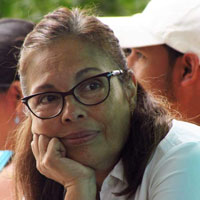
Michael Harris
Valentina Martinez
The program began with a simple idea, to provide students with methodological experience in the context of an overarching anthropological research project. To that end, we have structured our program as the investigation of regional economic and political development and natural resource utilization that stretches from prehistory to the present. The locus of this region in southern Manabí Province.
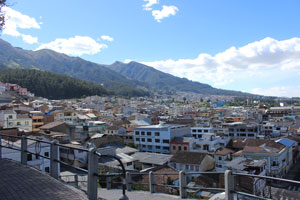
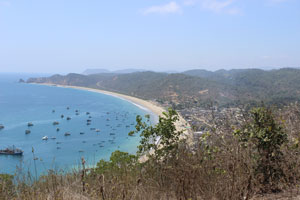
Quito, Ecuador
Salango, Manabi Province, Ecuador



Fishing Village Salango, Ecuador
This regional focus has led us to carry out research on coastal sites and villages as well as inland, montana and riverine areas, in the process identifyingover 300 prehistoric sites and carrying out ethnographic work in six villages and towns. The program's base of operations is the village of Salango, a vibrant fishing village with deep prehistoric roots. Our work has cooperatively involved the people of the village and we have deep and lasting relationships made possible by our long-term commitment. During these two decades, the program and the village have become part of each other's annual cycles.

Renovated Hacienda House
Salango is home to the Salango Research Center (Centro de Investigaciones y Museo Salango) and the field program has been very involved in advocating for the renovation and redesign of its facilities, in partnership with the local comuna of Salango, which is responsible for its administration. The research center is host to a prehistoric museum dedicated to the Salango archaeological site, originally created by Presley Norton, as well as other local sites more recently investigated by others. The center stores numerous artifact collections and houses a very fine zooarchaeological comparative collection of birds, fish, mollusks, and fauna. The hacienda house, one the few large, wooden house structures left on the coast, was renovated in 2007 with a grant from the U.S. Ambassador's Fund. That house now hosts an ethnographic museum, lab, and exhibition space.
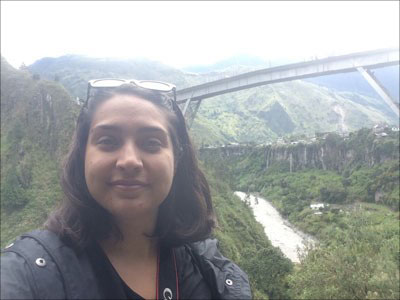
Graduate Student Bel Salah in Salango, Ecuador
The Ecuador Ethnographic Field School is six weeks filled with hands-on, putting methods into practice, experiences. I personally found it to be absolutely amazing! Even though speaking Spanish is helpful, it should not be a deal breaker. Dr. Harris provides us with local assistants that help us with our work, everything from translating, networking, to where to get the best food. The food is amazing! So fresh! The people are welcoming and the experience itself will change your life.
How it works: You work during the week on your assigned task and should be keeping detailed field notes that will help you with your final paper. You have your choice of topic that you can research, but if you need help Dr. Harris will help you. You'll have every weekend.


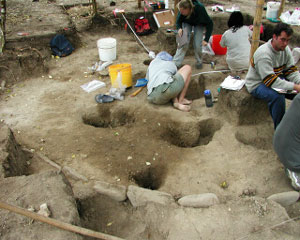

Archaeological Field Activities
During the weekend I visited the cities of Quito and Banos, along with other smaller towns in the area. All our traveling was done by bus or by "fletes" (their version of Uber). I met some amazing people and made great friends, both with locals and working with fellow field schoolers.

The compound is clean and kind of feels like a beach motel, with the sand and waves. I am so glad I had the opportunity to go last summer and find my thesis topic! I will be returning this upcoming summer!


Click here for more information about the Ecuador Field School
FPAN at FAU
Stronger Than Ever

Sara Ayers-Rigsby
Director of FPAN - Southern Region
Under the auspices of a new director and an expanded catchment area, the Florida Public Archaeology Network (FPAN) is an active force in south Florida. FPAN is a statewide organization dedicated to promoting and protecting Florida’s rich archaeological past. The state level program was created by former University of West Florida president, Dr. Judy Bense, and is hosted regionally by different universities who work in collaboration with one another. FAU hosts the south Florida region of FPAN, and encourages students at FAU to get involved.
The new regional director, Sara Ayers-Rigsby, comes from the private section with a new energy and vision for FPAN. Working with an expanded cadre of staff, students and volunteers, in a region that extends to all nine counties from south of Lake Okeechobee to the Keys, FPAN continues to fulfill its mandate to make everyone aware that archaeology is real and local, not just some pyramids in Egypt or ruins in Greece.

Undergraduate interns at Miami Circle site identifying Oolitic Limestone
Through public outreach, FPAN brings an understanding of archaeology to diverse groups. By coordinating the preservation of archaeological knowledge within the urban development framework of southern Florida, by creating alliances across institutions that can impact the perception of the archaeological resources of the region, as well as by promoting heritage tourism, FPAN has become a true resource and a voice for conservation and archaeological preservation in the south Florida region. With two offices, one in Fort Lauderdale covering the east coast region and the other in Fort Myers covering the west coast, FPAN is influencing the state’s archaeological landscape. In the Fort Lauderdale office, Mallory Fenn is the Public Archaeology Coordinator, and in Fort Myers, Rachael Kangas serves as the Public Archaeology Coordinator.
Recently FPAN has partnered with the Bureau of Land Management on FPAN’s HMS Florida Initiative, which educates volunteers on ways to protect the environment and archaeological resources from rising sea levels due to natural disasters like Hurricane Matthew. FPAN staff and volunteers have worked on excavation sites at Belle Glade and Mound Key. FPAN has also collaborated with Randall Research Center near Fort Myers and the University of Florida to assist in the survey and oversight of archaeological resources at Pineland, as well as with collaborating with the Randell Research Center on their children’s summer camps.

Rachael Kangas demonstrates archaeological techniques in Belle Glade, Florida
For FAU students, volunteering at FPAN is an opportunity to learn not only basic archaeological techniques such as surveying and preservation methods, but also about the cultural and environmental heritage of Florida. Graduate students have the opportunity of an assistantship with FPAN, and all students have the opportunity to meet and network with various area partners.
FPAN has come a long way since it was first contracted as a grant in the Anthropology Department at FAU in 2007. Through the efforts of dedicated staff and volunteers and the support of the Anthropology Department and the University at large, it has grown into a real voice and advocate for Florida’s archaeological history and environment.